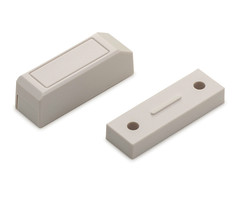Will Any Magnet Work w/ a Door or Window Alarm Sensor?
In theory, any magnet will work with a door or window alarm sensor. But this doesn't mean you should use any random magnet with a door and window sensor. Alarm equipment manufacturers build magnets specifically designed to work with contact sensors. Using a random magnet can cause problems.

A door and window contact sensor consists of two parts. These parts are a sensor and a magnet. The sensor goes on the door or window frame. The magnet goes on the moving portion of the door or window. For proper operation, the magnet will usually need to be within 0.5 inches of the sensor when the door or window is closed. Ideally, they should be in direct contact. This is how these sensors get their name of "contacts".
In normal operation, the magnet is keeping a reed switch housed inside the sensor closed. When the magnet separates from the sensor, the reed switch is released. This tells the sensor to alert the security system and let it know that the door or window has been opened. Since the magnet is really just keep the reed switch closed, any normal magnet can theoretically do the job. However, this does not mean a random magnet will perform effectively.
Magnets can differ greatly in terms of size and strength. The magnets that come with door and window sensors have certain specifications that make them ideal for the task at hand. If a magnet is too weak, the zone may remain faulted when the door or window is closed. If the magnet is too strong, then it may be possible to slightly open the door or window without faulting the zone. Additionally, a random magnet you pick up from the store may not provide the most aesthetically pleasing installation.
The best practice is to just use the original magnet that came with the door and window sensor. If you lose or damage that magnet, we have replacement options available, such as the Honeywell 5899. You can also search our site for other magnet options. Try using the search bar in the upper-right corner. At the very least, you should always magnet that was specifically designed for use with alarm contacts. Even if it isn't the exact same magnet, it will normally work just as well. Trial and error is important, and you should test the sensor if you decide to replace the magnet. But for best practice, do not use a random magnet you purchase from a store.
Please note that some specialty contact sensors may require an extra strong or large magnet for proper operation. Finding a replacement magnet for these sensors can be more difficult. An example of such a sensor is the Honeywell 5816OD. If you require a replacement magnet for a specialty contact, you should either contact us at support@alarmgrid.com to see if a replacement can be obtained or buy a new sensor.
Did you find this answer useful?
We offer alarm monitoring as low as $10 / month
Click Here to Learn MoreRelated Categories
- Answered
